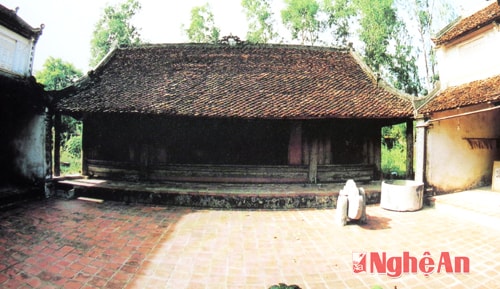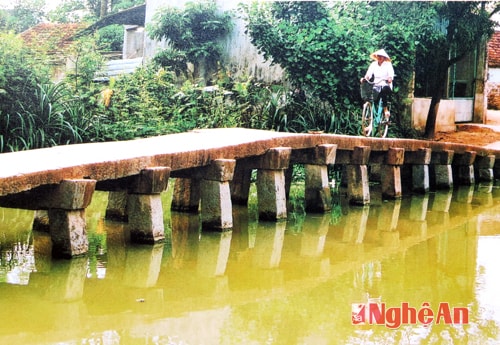Artist Vu Van Canh: The flame of passion
(Baonghean) - The office of the Vietnam Cinema Association is small but tidy. On the wall, a few photos are framed solemnly, including a photo of a harvest scene with rural women smiling brightly in the sunlight. The owner of the photos, photographer Vu Van Canh, said when he saw me admiring it: “That is in my hometown Yen Thanh. I have been to many places and encountered many beautiful scenes, but Yen Thanh is a land that seems to be worn out and I can still see its captivating beauty…”.
 |
Whenever meeting photographer Vu Van Canh, you will see him busy. However, when asked about his career, he is open and tells with pride: “I got involved with photography because I joined the army. In 1972, I joined the army. In 1975, when my unit attacked the gateway to Saigon and won, because I loved taking photos so much, I bought a camera for fun. Well, let's just say I started my career from that time…” Then, he turned over stories about his life and career like flipping through old photos, full of interest and emotion.
Photographer Vu Van Canh was born in 1955 in Nhan Thanh commune, Yen Thanh district. In 1984, while in charge of the photo room of the army's secret service, he was sent to study a 9-month basic photography course organized by the Vietnam Association of Photographic Artists. In 1989, he attended a 6-month art photography class also organized by the association. After completing the course, the class established the association's Art Photography Club, chaired by Vu Van Canh. Thanks to its good performance, the Club has encouraged its members to work enthusiastically in art. Therefore, later, 100% of the Club's members became members of the Vietnam Association of Photographic Artists, becoming one of the 7 branches operating in Hanoi under the Central Association.
The path that Vu Van Canh has chosen seems to be suitable for him both in the professional field and in the management role. In 1997, he was transferred to work as Head of the Personnel Organization Department of the Ministry of Culture and Information. Less than a year later, he was transferred to work as Deputy Chief of Office of the Vietnam Association of Photographic Artists. From March 2010 to present, he has been elected to the Standing Committee of the Association's Executive Committee, in charge of emulation, membership, photography copyright, Photography Magazine; in charge of foreign affairs and Head of the Project Management Board of the Vietnam Art Photography Archive and Exhibition Center, and in charge of the Photography sector of 23 provinces in the Red River Delta and the Northern mountainous region.
In his artistic career, Vu Van Canh is one of the artists who has won the most awards. Frowning slightly as if searching his memory, he said that he has won up to 28 awards of all kinds, including the Gold Medal awarded by the International Federation of Photographic Art in Malaysia in 2008; the International Silver Medal awarded by the FIAP Federation in Brazil; the Gold Medal awarded by the Vietnam Association of Photographic Artists in 2003 and 6 excellent Vietnamese photo awards for 6 works. Photographer Vu Van Canh is also an artist who has been awarded many titles: International Meritorious Artist of the FIAP Federation (E.FIAP) in 2005; International Special Meritorious Artist of the FIAP Federation (ES.FIAP) in 2009; Outstanding Vietnamese Photographer awarded by the Vietnam Association of Photographic Artists (E VAPA) in 2006 and Artist with Outstanding Contribution (ES VAPA) in 2008.
Some photos of NSNA Vu Van Canh about his homeland:
 |
| Dinh Hau (Bac Thanh - Yen Thanh) |
 |
| Ancient stone bridge of Phuc Thanh village. |
For nearly his entire life holding a camera, photographer Vu Van Canh has recorded hundreds of valuable journalistic and artistic photos. When asked about the essential qualities of a photographer, Vu Van Canh said: “Like other artists, a photographer needs many qualities. First of all, talent and professional ethics, then always being creative and loving the profession…”. He said that young artists often show interest and enthusiasm when they first enter the profession, but then quickly get bored. According to him, if you try to overcome that moment of discouragement, you will certainly succeed. Photography is different from other arts in that it is a creation based on the use of technology. This characteristic requires artists to always grasp science and technology to keep up with the times. Photography is also closely linked to economic, political and social events, to real life in an immediate and topical manner. Through their lens, the artist must promptly record those events in images, otherwise they will not be able to reproduce them later. Photography is also a quick, easy-to-understand art form, closer to the public than other art forms. This is considered an advantage of photography, requiring the artist to know how to take advantage of it and exploit it effectively.
The lively works, both journalistic and current, and highly artistic, by photographer Vu Van Canh have demonstrated his sincere thoughts. Having spent his whole life with a camera, no matter where he goes, he always returns to his hometown Yen Thanh, using it as a reference point for each time he takes a photo. Yen Thanh is not only the place where he was born but also the place that nurtured his soul and passion for art, the place where he dialogues with his conscience after each photo. He recalled with emotion: “When I was a buffalo herder and grass cutter, my friends often played chess and practiced. As for me, I don’t know why I just liked to watch the scenery of my hometown through bamboo tubes. Those tubes were only a few spans long, like binoculars, but to me they seemed to have magic. When I grew up a little bit, I took the buffaloes to graze in far away fields, even to neighboring communes dozens of kilometers away to freely immerse myself in nature. My hometown is truly beautiful, from mountains, rivers, lakes, to rice fields and crops stretching as far as the eye can see…”
Photographer Vu Van Canh did not expect that, from that bamboo and reed viewfinder, more than 30 years later, when he had just attended photography courses organized by the Vietnam Association of Photographic Artists, he decided to connect his artistic creation with his homeland. Instead of the bamboo and reed tubes of the past, he had modern cameras, crammed with all kinds of short and long lenses. The boy Canh used to ride a buffalo around the villages to see the scenery, but now sometimes he goes for a walk, sometimes he rides a bicycle or motorbike around the Yen Thanh village to hunt for photos. There were times when he woke up very early to catch a dawn like a bare chest covering the fields of his homeland, a sharp ray of sunlight diagonally across the rows of potatoes and rice fields. But there were also days when he had to stay up very late to capture the soul of his homeland in each frame. For him, the above photo hunting incident did not only happen a few times, but hundreds of times at any time of the day, of the year, in any corner of Yen Thanh. As if by magic, the scenery of his homeland at each moment has a different shade, and when photographed, everything comes alive. Therefore, hundreds of photos of Yen Thanh are not the same, each one seems to carry its own fate, its own sadness, joy, thought, and optimism.
For photographer Vu Van Canh, the lens does not exclude any scene, object or event. The problem is that through the artist's lens, what message has and will the photo send to the present and the future. Vu Van Canh depicts Yen Thanh from a spacious primary school (Vinh Thanh Primary School), a lake swaying with blue smoke in the afternoon (Vinh Thanh today), to fertile fields (Bao Thanh land), a lotus pond with endless flowers and leaves (Walking in the lotus season), to the sturdy and steadfast ancient stone bridge in Phuc Thanh (Phuc Thanh village's ancient stone bridge), and the relics, famous places, and close-up faces of the diligent farmers in his homeland Yen Thanh... Therefore, it is not difficult for viewers to recognize a Yen Thanh that is both resilient in the revolutionary struggle and dynamic and creative in building the homeland and is on the path of constant innovation. And perhaps, without many words, just looking at the photos of the homeland, you know that he loves and misses this land. It makes him, always like a child, when he comes back…
When we parted, photographer Vu Van Canh gave me a rather thick photo book of his about the people and land of Yen Thanh. I asked him if he still intended to publish more photo books about his hometown, he smiled and said honestly: "Yes! I just came from my hometown, and I have captured quite a lot of photos." Suddenly his voice dropped, thoughtful: "It's strange, my hometown is not that long and wide, but I can't travel all the way - in the art of photography! The more I travel, the more I feel like something is missing, something I haven't captured. Many times I've asked myself, have I not really burned myself out so that each frame, each photo can resonate with its own unique melody of my hometown Nghe An?"
As I left, I kept thinking about that feeling of lack of an artist. Perhaps each of us has had a time like that, when we feel that everything we do is not enough, not fully expressing or not fully lighting the fire that is burning inside us - the fire of love, of passion?
Thai Quynh


